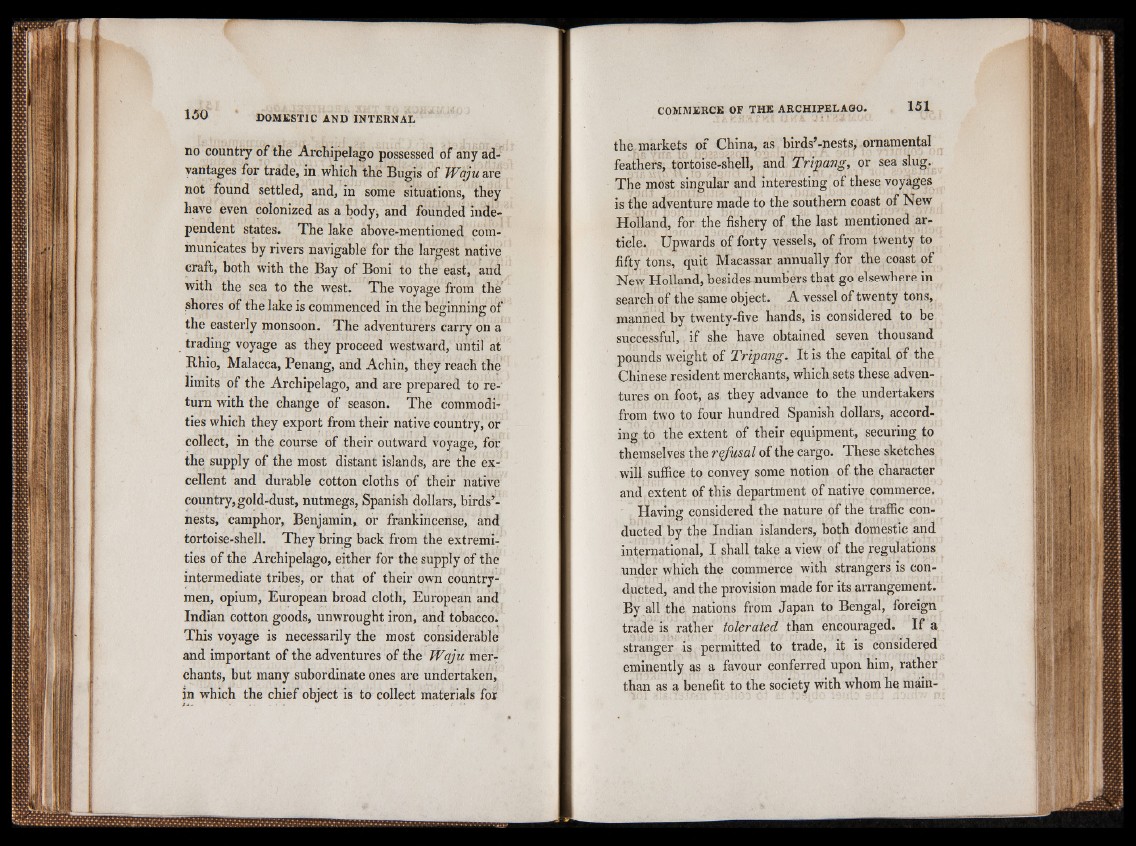
no country of the Archipelago possessed of any advantages
for trade, in which the Bugis of Waju are
not found settled, and, in some situations, they
have even colonized as a body, and founded independent
states. The lake above-mentioned communicates
by rivers navigable for the largest native
craft, both with the Bay of Boni to the east, and
with the sea to the west. The voyage from the*
shores of the lake is commenced in the beginning of
the easterly monsoon. The adventurers carry on a
trading voyage as they proceed westward, until at
Rhio, Malacca, Penang, and Achin, they reach the
limits of the Archipelago, and are prepared to re-'
turn with the change of season. The commodities
which they export from their native country, or
collect, in the course of their outward voyage, for
the supply of the most distant islands, are the excellent
and durable cotton cloths of their native
country, gold-dust, nutmegs, Spanish dollars, birds’-
nests, camphor, Benjamin,, or frankincense, and
tortoise-shell. They bring back from the extremities
of the Archipelago, either for the supply of the
intermediate tribes, or that of their own countrymen,
opium, European broad cloth, European and
Indian cotton goods, unwrought iron, and tobacco.’
This voyage is necessarily the most considerable
and important of the adventures of the Waju merchants,
but many subordinate ones are undertaken,
in which the chief object is to collect materials for
the markets of China, as birds’-nests, ornamental
feathers, tortoise-shell, and Tripang, or sea slug.
The most singular and interesting of these voyages
is the adventure made to the southern coast of New
Holland, for the fishery of the last mentioned ar-
ticlel Upwards of forty vessels, of from twenty to
fifty tons, quit Macassar annually for the coast of
New Holland, besides numbers that go elsewhere in
search of the same object. A vessel of twenty tons,
manned by twenty-five hands, is considered to be
successful,, if she have obtained seven thousand
pounds weight of Tripang. It is the capital pf the
Chinese resident merchants, which sets these adventures
on foot, as they advance to the undertakers
from two to four hundred Spanish dollars, according
to the extent of their equipment, securing to
themselves the refusal of the cargo. These sketches
will suffice to convey some notion of the character
and extent of this department of native commerce.
Having considered the nature of the traffic con-
ducted by the Indian islanders, both domestic and
international, I shall take a view of the regulations
under which the commerce with strangers is conducted,
and the provision made for its arrangement.
By all the nations from Japan to Bengal, foreign
trade is rather tolerated than encouraged. If a
stranger is permitted to trade, it is considered
eminently as a favour conferred upon him, rather
than as a benefit to the society with whom he main